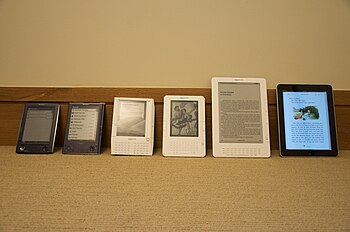When it comes to e-readers, there seems to be a lot of pessimism. Note that we are talking about e-readers, not about e-books, books, writing or reading.
Let us enter our custom built time machine and travel back to iPod days. I remember my first iPod. It was white with a whole Gigabyte of memory. How wonderful! No matter where you went, people were using their iPods or similar mp3-player devices to avoid talking to other people.
And then they just disappeared! It is true that they are still for sale and that Apple is still actively marketing them, but if you compare their popularity now to a few years ago, it is figuratively accurate to say that they have disappeared.
The omnipresent iPod made way for smartphones and tablets. These are small too, small enough to fit in your pocket or backpack when you are jogging or out on an invigorating hike.
Now, let us take a more detailed look at the e-reader world. The original online bookstore Barnes & Noble is busy selling their Nook division. You can hardly blame them. Profits from these devices dropped nearly 25% during the last quarter and by more than a third during the last financial year.
Sony has exited the e-reader market. Their reader was unable to challenge the market leading Kindle. Sales were very low and slow, forcing them to stop manufacturing the Sony e-reader. There are no plans for designing or producing a follow-up device.
E-Ink holdings–the guys who manufacture the actual displays that Kindle, Kobo and the rest use– has also reported a sharp dip in sales of the displays. The logic is clear, less displays being sold, less e-readers being sold.
E-Ink reported a 46% drop in sales during 2013. If you look at all these facts together, it is clear the e-reader market is shrinking. Mashable’s statement that the e-reader is going to follow the way of the iPod is understandable. Millions are reading on their phones and tablets. All the major bookstores offer some kind of reading app.
It seems, however, that Kobo either did not hear the news that e-readers are slowly becoming less popular or they know something that we don’t.

various e-book readers. From right to left iPad (Apple、2010) kindle DX (Amazon、2009) kindle 2 (Amazon、2009) kindle 1 (Amazon、2007) PRS-505 (Sony、2007) PRS-500 (Sony、2006). (Photo credit: Wikipedia)
Trick or Treat: Kobo
In early October 2014, Kobo CEO Michael Tamblyn announced that Kobo has decided to focus on e-readers and apps in the future and is not going to continue or expand the existing tablet range. Kobo will, obviously, continue to support these devices. Furthermore, Kobo will take over Sony’s existing e-reader business. This will garner them a whopping 25 000 new clients. In the future, Sony devices will have Kobo readers pre-installed.
What does Kobo know that Sony and Nook don’t? Figures seem to indicate that Kobo is more popular than generally thought. It has about 50% of the market in Canada, and 20% of the global market in spite of its poor showing in the USA where it has only as 3% of the market.
In 2013, figures suggest that Kobo doubled its market share.
Why is Kobo achieving success while the other e-readers are failing? One thing that should be remembered is that nearly all e-readers use the open source EPUB format. That means that Kobo, Nook and Sony are direct competitors. Kindle uses Amazon’s proprietary format and therefore is an indirect direct competitor. A what? The one bunch runs on diesel and the other on gasoline. It is a crude comparison, but you get it.
One possibility is that Kobo is just mopping up those who do not want to, for whatever reason, switch over to Kindle and Amazon.
Therefore…
I have used the Swiss Army knife example elsewhere. As a multi-purpose tool it is pure genius. As a knife it is ok. As a screwdriver its usability is limited. It does not make for a great pair of scissors. The saw is sharp but unwieldy.
The fact that it can McGyver you out of a bind is great. The fact that you do not have to carry ten different tools on a hike is great, but if you really need a saw use a real one.
For reading, an e-reader is much better and nicer to use than a multi-purpose tool, e. g. phone, phablet or tablet. Yet it is much more practical to carry just one tool with you, like a tablet, on the way to work, or on a trip.
Reading won’t die. I contend that the majority of readers read to escape. In spite of better high speed Internet connections, more TV shows, etc., books provide a unique place of solitude and peace.
So, I am guessing that in X-years time there will be much fewer dedicated e-readers on the market, but that their users will on the whole be more dedicated to their devices. As long as Kindles cannot read EPUB, Kobo or some other e-reader player will exist.




